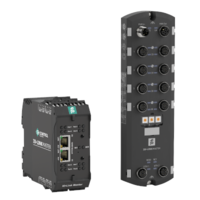IO-Link Master with OPC UA Interface Enables Seamless Information Exchange from Field to Cloud

ICE2/ICE3 Series IO-Link Masters in IP20 and IP67 Type of Protection
Plants, products, and systems are becoming increasingly networked. This has resulted in a major effort to set machine-to-machine (M2M) communication standards. In recent years, one such standard has already established itself on the market: OPC UA. This cross-vendor, open architecture is designed for information exchange in industrial communication. In addition to M2M communication, the technology supports data and information exchange between machines and higher-level systems in Industry 4.0 environments. Pepperl+Fuchs presents the world’s first IO-Link master with an OPC UA interface that combines the architecture’s benefits in one device.
Seamless Communication at Every Level
OPC UA, short for Open Platform Communications Unified Architecture, enables the platform-independent, interoperable, and cross-vendor collaboration of machines in production and makes communication between machines and systems possible—both in closed networks and via internet. OPC UA is more than just a communication protocol because the architecture also includes data models and interaction concepts. The interface is also scalable, which makes it suitable for both small- and large-scale infrastructures and supports use with mobile devices.
OPC UA is based on standards and guidelines that must be followed for compliant use of OPC UA communication. This way, the technology helps make processes in plants even more efficient while ensuring a seamless information exchange across all levels.
Your Solution for Cloud- and PLC-Based Systems
For the first time, Pepperl+Fuchs has incorporated OPC UA into IO-Link masters and is now introducing the ICE 2 (EtherNet/IP) and ICE3 (PROFINET) master series in addition to the ICE1 masters that are used for PLC-based systems and time-critical applications. Both new IO-Link master series come with an OPC UA interface and a real-time fieldbus protocol, making them an ideal solution for cloud-based applications that are less time-sensitive. With a completely web-based configuration concept that does not require additional software, they exemplify efficient commissioning and are an optimal solution for standalone applications with no superior PLC. All module settings can be saved as a separate file, so the configuration can be easily transferred to a new device (module cloning).
Simultaneous, interference-free communication via OPC UA and Ethernet-based fieldbus protocols also makes hybrid systems possible. In these cases, a PLC coordinates all time-sensitive applications and processes, while less time-sensitive, aggregated condition data is transferred to the cloud. Because of the MultiLink protocol, users can simultaneously access the device via the PLC and the cloud.
Highlights of the IO-Link Masters with OPC UA Interface
-
Cross-vendor, platform-independent exchange of information (M2M communication)
-
Flexible solution for both cloud-based and hybrid systems with a combination of PLC and cloud
-
Completely web-based configuration concept for user-friendly commissioning
-
Module cloning function enables easy device replacement and plant expansion









 +27 87985 0797
+27 87985 0797